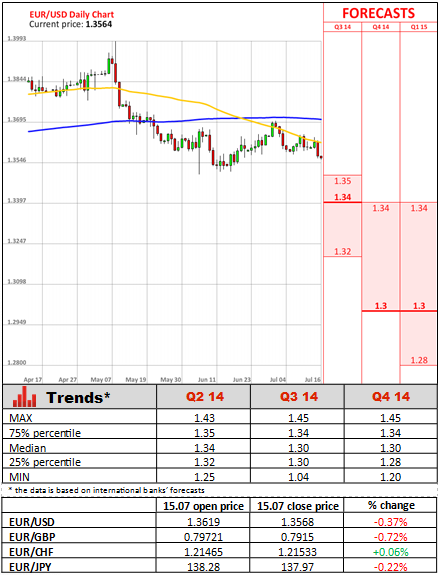The single currency slipped sharply lower following the release of German ZEW investor sentiment. Investors in Europe's number one economy remained sceptical on German economic prospects, with the influential ZEW index falling 2.7 points to 27.1 in July, recording the seventh consecutive drop. The gauge hit the lowest level since December 2012, was also below the long-term medium of 24.7 and against market consensus for a reading of 28. A separate gauge of current conditions fell to 61.8 from 67.7 in June, undershooting expectations. The survey results, which were derived from responses of around 240 analysts and institutional investors, show that investors and business leaders are lukewarm about both the current and long-term climate of the German economy. A frequent criticism of the ZEW index is that it can be volatile and is, therefore, not particularly reliable. Nevertheless, the Euro weakened to a one-week low versus the U.S. Dollar, falling to $1.3587. The shared currency also lost 0.1% versus the Japanese Yen to trade at 138, and it was down 0.5% against the Pound, with the Sterling receiving boost from better-than-expected U.K. CPI data.
Note: This section contains information in English only.
The single currency slipped sharply lower following the release of German ZEW investor sentiment. Investors in Europe's number one economy remained sceptical on German economic prospects, with the influential ZEW index falling 2.7 points to 27.1 in July, recording the seventh consecutive drop. The gauge hit the lowest level since December 2012, was also below the long-term medium of 24.7 and against market consensus for a reading of 28. A separate gauge of current conditions fell to 61.8 from 67.7 in June, undershooting expectations. The survey results, which were derived from responses of around 240 analysts and institutional investors, show that investors and business leaders are lukewarm about both the current and long-term climate of the German economy. A frequent criticism of the ZEW index is that it can be volatile and is, therefore, not particularly reliable. Nevertheless, the Euro weakened to a one-week low versus the U.S. Dollar, falling to $1.3587. The shared currency also lost 0.1% versus the Japanese Yen to trade at 138, and it was down 0.5% against the Pound, with the Sterling receiving boost from better-than-expected U.K. CPI data.

Wed, 16 Jul 2014 08:55:09 GMT
Source: Dukascopy Bank SA
"Germany has experienced a slight dent in economic activity recently -- retail sales declined and industrial production as well as incoming orders dropped"
-Clemens Fuest, ZEW President
The single currency slipped sharply lower following the release of German ZEW investor sentiment. Investors in Europe's number one economy remained sceptical on German economic prospects, with the influential ZEW index falling 2.7 points to 27.1 in July, recording the seventh consecutive drop. The gauge hit the lowest level since December 2012, was also below the long-term medium of 24.7 and against market consensus for a reading of 28. A separate gauge of current conditions fell to 61.8 from 67.7 in June, undershooting expectations. The survey results, which were derived from responses of around 240 analysts and institutional investors, show that investors and business leaders are lukewarm about both the current and long-term climate of the German economy. A frequent criticism of the ZEW index is that it can be volatile and is, therefore, not particularly reliable. Nevertheless, the Euro weakened to a one-week low versus the U.S. Dollar, falling to $1.3587. The shared currency also lost 0.1% versus the Japanese Yen to trade at 138, and it was down 0.5% against the Pound, with the Sterling receiving boost from better-than-expected U.K. CPI data.
Meanwhile, the Euro zone's economic sentiment plunged 10.3 points to 48.1 in July; likewise, the current conditions declined 3.8 points to –31.5.
© Dukascopy Bank SA
Actual Topics
Subscribe to "Fundamental Analysis" feed
Souscrire
To learn more about Dukascopy Bank CFD / Forex trading platform, SWFX and other trading related information,
please call us or make callback request.
please call us or make callback request.
For further information regarding potential cooperation,
please call us or make callback request.
please call us or make callback request.
To learn more about Dukascopy Bank Binary Options
/ Forex trading platform, SWFX and other trading related information,
please call us or make callback request.
please call us or make callback request.
To learn more about Dukascopy Bank CFD / Forex trading platform, SWFX and other trading related information,
please call us or make callback request.
please call us or make callback request.
To learn more about Crypto Trading / CFD / Forex trading platform, SWFX and other trading related information,
please call us or make callback request.
please call us or make callback request.
To learn more about Business Introducer and other trading related information,
please call us or make callback request.
please call us or make callback request.
For further information regarding potential cooperation,
please call us or make callback request.
please call us or make callback request.